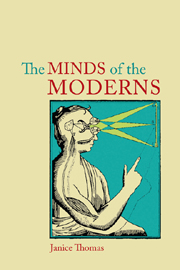Book contents
- Frontmatter
- Contents
- Acknowledgements
- Abbreviations
- Introduction
- I Descartes
- II Spinoza
- III Leibniz
- 11 Is the mind a substance for Leibniz?
- 12 Self-knowledge and the monads
- 13 Leibniz on consciousness and unconscious perceptions
- 14 Leibniz and the problem of mental causation
- 15 Leibniz and representation
- IV Locke
- V Berkeley
- VI Hume
- Conclusion
- Bibliography
- Index
14 - Leibniz and the problem of mental causation
from III - Leibniz
- Frontmatter
- Contents
- Acknowledgements
- Abbreviations
- Introduction
- I Descartes
- II Spinoza
- III Leibniz
- 11 Is the mind a substance for Leibniz?
- 12 Self-knowledge and the monads
- 13 Leibniz on consciousness and unconscious perceptions
- 14 Leibniz and the problem of mental causation
- 15 Leibniz and representation
- IV Locke
- V Berkeley
- VI Hume
- Conclusion
- Bibliography
- Index
Summary
Does Leibniz believe that my mind and my mental states have the power to move my body and to affect the course of physical events? We have seen that Descartes thinks that a human mind can move its body by force of will, just as God – although wholly immaterial – moves matter by the power of his thought alone. Spinoza disagrees, denying the possibility of causal interaction between individual minds and their bodies and, in general, between the mental realm and the physical realm. For him, all physical events have exclusively physical causes while mental happenings have none but mental causes and explanations.
Leibniz's mental causation problem
Leibniz's position on mental causation is more complex still, and perhaps also even more counter-intuitive than these. On the one hand, Leibniz describes the human mind as the dominant monad in the collection of monads making the well-founded phenomenon of a human being a genuine unity. And the dominance of the monad seems to include guiding the behaviour of the whole person or mind–body union. Moreover, Leibniz never questions (indeed he insists) that human beings are morally responsible for their acts. They are free to choose and act well or badly and therefore deserve praise and blame as appropriate.
On the other hand, he holds that monads or immaterial substances cannot be affected from without, influenced or “moved” by anything, even another monad.
- Type
- Chapter
- Information
- The Minds of the ModernsRationalism, Empiricism and Philosophy of Mind, pp. 126 - 131Publisher: Acumen PublishingPrint publication year: 2009

